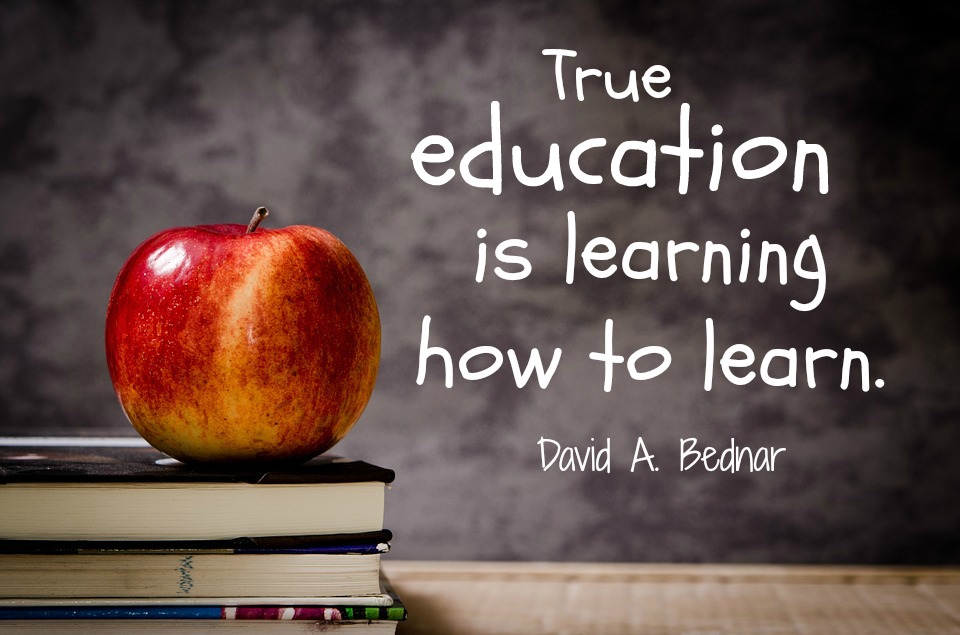Mormon intellectuals, it appears, are keeping the faith. Members of The Church of Jesus Christ of Latter-day Saints who have college and post-graduate degrees are found at church on Sunday. They are found studying their scriptures daily. They are found praying multiple times a day. And they are found in these pursuits in greater numbers than their counterparts in other religions, according to an analysis of the data from the 2007 Pew study of religions. Political pollster (and Latter-day Saint) Gary C. Lawrence wrote,
Nine out of ten of our members who have college or post-graduate degrees report attending religious services at least once a week. This is 30 points higher than Protestants, 40 points higher than Catholics, and 70 points higher than Jews.
Our least well-educated members are more active (devout, committed, observant) than the best educated of these other religions. …
The same patterns hold for multiple daily prayers: our advance degreed members seek the blessings of our Heavenly Father on a daily basis in much greater numbers than their counterparts.
What the numbers don’t tell is why Mormon intellectuals are found in the pews at church on Sunday in greater numbers than their counterparts of other faiths. But Lawrence has insight on this:
So why are we Mormons especially successful in keeping our intellectuals? Because the Savior’s re-established doctrines provide intellectually challenging and satisfying answers to the deepest questions man can ask, plus insights that are more felt in the heart than articulated in the mind on topics mankind cannot even imagine.
That’s the fun of true gospel-based intellectualism.
Gospel-based intellectualism is rooted in the teachings of Jesus Christ and the doctrines of the Mormon faith. For Latter-day Saints, our religious beliefs enhance our learning and education, providing a context and foundation for it in our lives. President Gordon B. Hinckley stated:
There is incumbent upon each of us as members of The Church of Jesus Christ of Latter-day Saints the responsibility to observe the commandment to study and to learn.
Elder Dallin H. Oaks said,
As Latter-day Saints we believe in education, and we have a philosophy about how and why we should pursue it. Our religious faith teaches us that we should seek learning by the Spirit and that we have a stewardship to use our knowledge for the benefit of mankind.
Intellectuality isn’t just gaining an education—it’s also using it in our lives. The gospel of Jesus Christ helps us to understand why and what we learn as well as what we should do with the knowledge that we gain.
Why Gaining an Education is a Commandment
Latter-day Saints believe that the purpose of mortality is to gain an education. President Henry B. Eyring taught,
The purpose of God’s creations and of His giving us life is to allow us to have the learning experience necessary for us to come back to Him, to live with Him in eternal life. That is only possible if we have our natures changed through faith in the Lord Jesus Christ, true repentance, and making and keeping the covenants He offers all of His Father’s children through His Church.
So the leaders of the Church have always known that the drive for learning among our people must have a powerful spiritual component. That spiritual element, when it is effective, refines and uplifts the aims of our total education.
But education isn’t necessarily just obtaining a degree from an accredited university. Elder David A. Bednar said:
I have spent most of my life involved in education. When I was younger, I thought education meant going to school, taking tests, and getting good grades. But as I grew older, I began to learn the difference between doing well in school and becoming educated. A person can do well on tests and still not be educated. True education is learning how to learn. Once I discovered that lesson, learning became fun.
One of the primary purposes of mortality is to learn—to gain knowledge and intelligence. Doctrine and Covenants 93:36 states, “The glory of God is intelligence.” You might think intelligence means being gifted in academic work, but intelligence also means applying the knowledge we obtain for righteous purposes.
For Latter-day Saints, education and knowledge are eternal concepts. President Eyring said,
The real life we’re preparing for is eternal life. Secular knowledge has for us eternal significance. Our conviction is that God, our Heavenly Father, wants us to live the life that He does. We learn both the spiritual things and the secular things “so we may one day create worlds [and] people and govern them” (Spencer W. Kimball, The Teachings of Spencer W. Kimball, ed. Edward L. Kimball [1982], 386). All we can learn that is true while we are in this life will rise with us in the Resurrection. And all that we can learn will enhance our capacity to serve. That is a destiny reserved not alone for the brilliant, those who learn the most quickly, or those who enter the most respected professions. It will be given to those who are humbly good, who love God, and who serve Him with all their capacities, however limited those capacities are—as are all our capacities, compared with the capacities of God.
Gaining an education is a commandment because what we learn helps us not only in this life, but also in the eternities.
Seek First the Kingdom of God
Gaining knowledge begins not with our secular education but with our spiritual. President Ezra Taft Benson explained it best when he said:
When we put God first, all other things fall into their proper place or drop out of our lives. Our love of the Lord will govern the claims for our affection, the demands on our time, the interests we pursue, and the order of our priorities.
This is the reason that our quest for knowledge must begin with our spiritual education. Our spiritual education doesn’t begin at kindergarten or preschool, but as infants and toddlers. We learn who God is—and who we are, why we are here and where we are going after we die. When we understand that we are God’s children and what our purpose is in this life, it brings greater meaning and value to the purpose of learning. President Thomas S. Monson said,
In the Church, the goal of gospel teaching is not to pour information into the minds of God’s children, whether at home, in the classroom, or in the mission field. It is not to show how much the parent, teacher, or missionary knows. Nor is it merely to increase knowledge about the Savior and His Church.
The basic goal of teaching is to help the sons and daughters of Heavenly Father return to His presence and enjoy eternal life with Him. To do this, gospel teaching must encourage them along the path of daily discipleship and sacred covenants. The aim is to inspire individuals to think about, feel about, and then do something about living gospel principles. The objective is to develop faith in the Lord Jesus Christ and to become converted to His gospel.
When we are converted to the gospel of Jesus Christ, we want to do better and be better, becoming the sons and daughters that God wants us to be. President Eyring said:
The thirst for education that comes with the change the gospel brings can be a blessing or a curse, depending on our motives. If we continue to seek learning to serve God and His children better, it is a blessing of great worth. If we begin to seek learning to exalt ourselves alone, it leads to selfishness and pride, which will take us away from eternal life.
That is one of the reasons we should always put spiritual learning first.
Elder L. Tom Perry said,
Learning about sacred things should come first, providing a context and need for secular learning. If we want to return to our Heavenly Father’s presence, our first priority should be to learn about his ways and his plan.
The world would want to fool us into believing that there is insufficient time to engage in both spiritual and secular learning. I warn us not to be deceived by these philosophies of men. Our learning about sacred things will facilitate, even accelerate, our secular learning. …
If we provide a spiritual foundation for our secular learning, not only will we better understand the laws of nature, but we can gain a depth of understanding never before imagined possible about art, languages, technology, medicine, law, and human behavior. We can see the world around us and understand it through God’s eyes.
Rather than limiting our knowledge, studying the things of God first helps us to prioritize our acquisition of it.
Our Study of the World Should Broaden our Horizons
Our study of the world need not—and should not—be limited to religious teachings. Elder Oaks said,
Our quest for truth should be as broad as our life’s activities and as deep as our circumstances permit. A learned Latter-day Saint should seek to understand the important religious, physical, social, and political problems of the day. The more knowledge we have of heavenly laws and earthly things, the greater influence we can exert for good on those around us and the safer we will be from scurrilous and evil influences that may confuse and destroy us.
President Eyring said,
It is clear that our first priority should go to spiritual learning. For us, reading the scriptures would come before reading history books. Prayer would come before memorizing those Spanish verbs. A temple recommend would be worth more to us than standing first in our graduating class. But it is also clear that spiritual learning would not replace our drive for secular learning.
The Lord clearly values what you will find in that history book and in a text on political theory. Remember His words. He wants you to know “things which have been, things which are, things which must shortly come to pass; things which are at home, things which are abroad; the wars and the perplexities of the nations” (Doctrine & Covenants 88:79). And He favors not only Spanish verbs but the study of geography and demography. You remember that His educational charter requires that we have “a knowledge also of countries and of kingdoms” (Doctrine & Covenants 88:79). There is also an endorsement for questions we study in the sciences. It is clear that putting spiritual learning first does not relieve us from learning secular things. On the contrary, it gives our secular learning purpose and motivates us to work harder at it.
This philosophy of education is not limited to the Mormon faith. In fact, it is not even limited to the modern days. Robert P. George, McCormick Professor of Jurisprudence at Princeton University, said,
In the words of Pope John Paul II, the philosophy professor who became pope and who has now been canonized as a saint, “Faith and reason are like two wings on which the human spirit rises to the contemplation of truth.”
The two wings are not separate paths to truth. Just as both wings are necessary and must be in working order for the dove or the eagle to fly, so too both faith and reason are necessary for the intellectual and spiritual quest and for the intellectual and spiritual life. And faith and reason do not work separately or independently of one another, but rather they work together, in harmony. Faith and reason mutually entail and require each other. Neither can truly exist—faith cannot truly be faith, reason cannot truly be reason—wholly apart from one another.
This helps to explain why Christianity has built not only majestic cathedrals in which to worship but also great universities in which to study and learn. The very idea of a university is religious and, indeed, Christian in its inspiration, conception, and fundamental content.
The twin wings of faith and reason allow us to soar to intellectual heights. But this has ever been the case. President Russell M. Nelson said,
Some of the greatest “intellectuals” have been those with the strongest faith. Socrates felt that the unexamined life is not worth living, so nothing was exempt from his questioning. But he, with Immanual Kant, had unwavering faith in God, freedom, and immortality. Socrates never doubted the will of his personal God. He believed so much in freedom that he tied his own self-responsibility to that freedom. So deeply did he believe in the doctrine of immortality of the soul that although he might have prolonged his biological life by choosing exile, he submitted with complete serenity to the death sentence of the Athenian court.
Our spiritual understanding provides a strong foundation upon which to build our secular knowledge.
‘Enter to Learn, Go Forth to Serve’
Latter-day Saints believe that the purpose of education is to enrich our lives and bless the lives of those around us by serving others. Elder Perry said,
Some among us preach the doctrine of “me-ism.” They declare that we should think of ourselves first and foremost and above all else. History, however, has taught that selfishness has never brought happiness. An important part of life is serving and sharing. Certainly the soul-satisfying joy of life is leaving a legacy of love and service for others to emulate and enjoy. …
Entering this earth life to learn and then going forth to serve represent the purpose of our mortal existence.
This is the understanding that helps us to see the connection between secular and spiritual education. President Eyring said,
The Lord knows both what He will need you to do and what you will need to know. He is kind and He is all-knowing. So you can with confidence expect that He has prepared opportunities for you to learn in preparation for the service you will give. You will not recognize those opportunities perfectly, as I did not. But when you put the spiritual things first in your life, you will be blessed to feel directed toward certain learning, and you will be motivated to work harder. You will recognize later that your power to serve was increased, and you will be grateful.
Perhaps one of the greatest gifts of gospel-based intellectualism is that our opportunities to learn and grow never cease. President Eyring taught,
No service that matters can be given over a lifetime by those who stop learning. A great teacher is always studying. A nurse never stops facing the challenge of dealing with something new, be it equipment or procedure. And the workplace in every industry is changing so rapidly that what we know today will not be enough for tomorrow.
Our education must never stop. If it ends at the door of the classroom on graduation day, we will fail. And since what we will need to know is hard to discern, we need the help of heaven to know which of the myriad things we could study we would most wisely learn.
Thus, as President Hinckley said,
What a charge has been laid upon us to grow constantly toward eternity! None of us can assume that he has learned enough. As the door closes on one phase of life, it opens on another, where we must continue to pursue knowledge.
Ours ought to be a ceaseless quest for truth. That truth must include spiritual and religious truth as well as secular.








